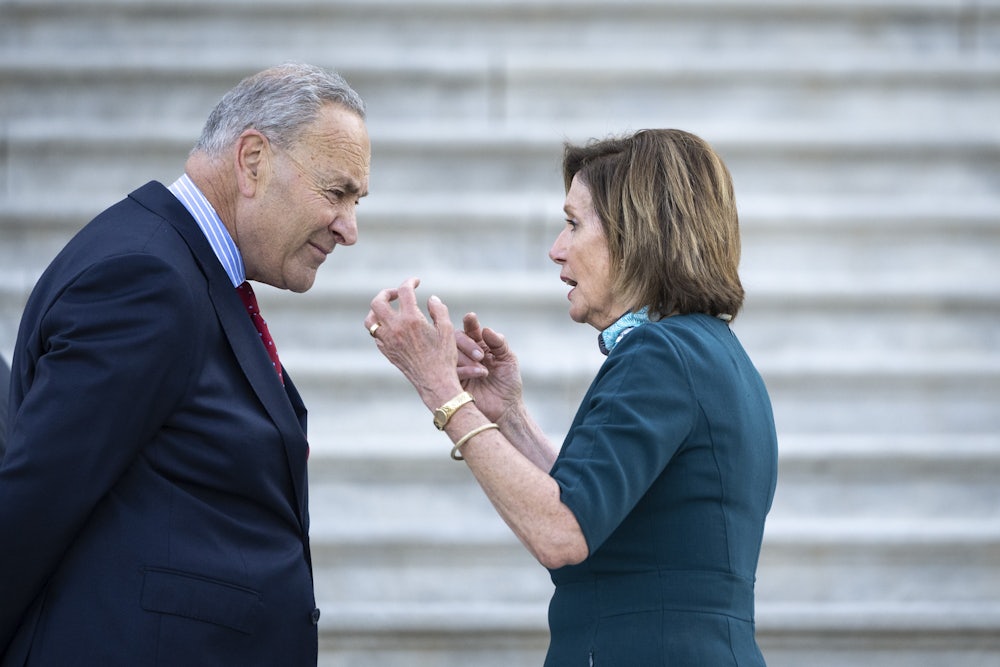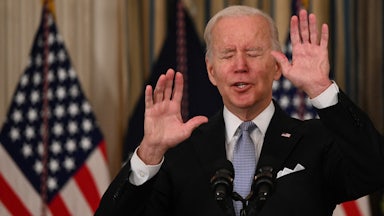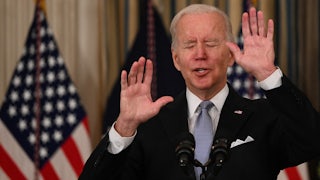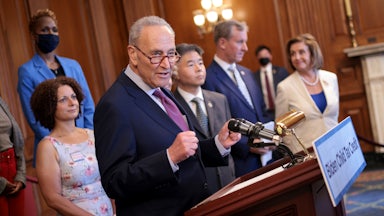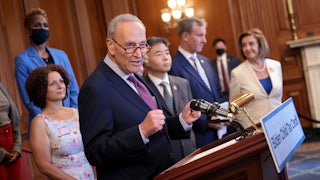December is, generally speaking, a time for reflection and anticipation, appreciating the accomplishments of the previous year while looking forward to the next one. But this is not the case for members of our illustrious legislative branch, who often take December to address several critical issues in a slapdash fashion, in extreme cases working until the final moments of the year to address outstanding problems. Congress officially finished its business one week before Christmas but left Washington with several loose ends untied. The new year will dawn with Congress having to finish work that’s not yet done; it may end with lawmakers having to address fresh crises no one saw coming.
Determining what lawmakers may tackle in 2022 requires making some basic assumptions. But let’s forget what your mother told you about people who assume, and sketch these possibilities out. The first and most obvious assumption is that, barring a visit to Senator Joe Manchin from some Christmas ghost that leads to a change of heart, the Senate will not finalize or pass the Build Back Better Act, the Biden administration’s capstone investment in social and climate-related programs that will also overhaul the nation’s tax policy.
Democratic leadership wanted to put this matter to bed by the end of the year; Senate Majority Leader Chuck Schumer, in fact, had hoped to put Build Back Better underneath the tree when America awoke on Christmas morning. Instead, Congress left Washington without reaching a deal on the legislation. Shortly after senators skedaddled from the Capitol, Manchin placed a lump of coal in the stocking of Democrats’ hopes and dreams with his stated opposition to the current version of the Build Back Better Act.
Manchin’s announcement, which was met with frustration from his fellow Democrats and Biden, puts the Build Back Better Act on ice. Schumer pledged in a December 20 letter to colleagues that the Senate will take up the bill when it returns. “We are going to vote on a revised version of the House-passed Build Back Better Act—and we will keep voting on it until we get something done,” he said.
But without Manchin’s vote, and with uniform opposition from all 50 Republicans, it is not likely to move forward. Manchin’s opposition does not necessarily mean that the Build Back Better Act as a whole is doomed, only its current iteration. It’s possible that Democrats continue negotiations with the West Virginia senator and whittle down the bill to its core components, including strengthening the Affordable Care Act and retaining climate-related provisions.
Despite what people say about nothing getting done in a midterm election year, major legislation can be approved. After all, Democrats defied conventional wisdom by approving the Affordable Care Act after months and months of agita in March 2010, just a few months before they lost the House in the midterm elections. But it’s difficult to see how it becomes any easier to pass the Build Back Better Act next year, especially if the outstanding issues that are currently providing all the intraparty tensions remain. “Another month, another three months, is not going to make this any easier. It’s time for us to cut our final deals,” Senator Elizabeth Warren told reporters in early December.
Passing the Build Back Better Act had particular urgency beyond merely handing the president a legislative win: It includes a one-year extension of the expanded child tax credit. Unless Congress passes the bill by December 28, the Treasury Department will not be able to continue sending monthly payments to families on January 15, and millions of children who have only recently been able to receive the full credit would lose it again. (The expanded credit, put in place by the $1.9 trillion American Rescue Plan Act in March, for the first time allowed parents too poor to file income taxes to receive the full credit. This provision would expire at the end of December, along with the larger amount and the practice of delivering the credit in monthly installments.)
But Manchin remains opposed to extending the expanded child tax credit, which other Democrats view as a core component of the Build Back Better Act and one of their key legislative achievements. Whether an agreement can be reached on that provision is yet to be seen, considering that Manchin and other Democrats remain on opposite poles of this issue.
The Build Back Better Act also included an issue of particular import to Manchin’s state: a four-year extension of a critical excise tax that funds a program that provides benefits to veteran coal miners disabled with black lung disease. Without the passage of the Build Back Better Act, and the extension it included, the tax will be more than halved—threatening the future of the Black Lung Disability Trust Fund, which is already facing insolvency. “If we don’t get the Build Back Better Act passed with a four-year extension included, I don’t understand what will happen with the fund from here,” said Gary Hairston, the president of the National Black Lung Association and a former coal miner with black lung disease in Fayette County, West Virginia, in a statement. (Manchin has introduced a 10-year extension of the tax, but its fate in Congress is just as uncertain as the Build Back Better Act’s, if not more, because it does not yet have support in the House.)
But the Build Back Better Act is one small piece of an overwhelmingly large pie of legislative responsibilities. Congress must also fulfill its most basic of duties: funding the government. Congress approved a continuing resolution to keep the government funded at current levels through February 18, but that is just a temporary stopgap measure that does not provide new appropriations. Members are currently in negotiations over an omnibus appropriations package but have yet to reach any agreements.
“While this short-term measure is needed to avoid a government shutdown, we must use this additional time to enact a bipartisan, bicameral omnibus appropriations bill, which is the only way to provide certainty and support to working families, small businesses, veterans, and our military,” House Appropriations Committee Chair Rosa DeLauro said in an early December statement after the continuing resolution was passed. “As we extend funding to February 18, Republicans must offer constructive proposals to address the critical issues facing the country by funding the federal government’s important work for the American people.”
Congress may also have to lift the country’s borrowing cap again. After months of stalemate, lawmakers reached a tortured agreement to raise the debt ceiling by a numerical amount in mid-December. They may have to lift it again before the end of the year—setting up another potential showdown that risks catastrophic default at the end of the year. Depending on how that matter is resolved, Congress may have to mark another date in the calendar to perform this ritual again in 2022.
Lawmakers pride themselves on their annual approval of the National Defense Authorization Act, which outlines defense policy for the coming fiscal year. The amount spent on defense continues to balloon, rising to $768 billion for fiscal year 2022, even as the United States attempts to extricate itself from foreign conflicts. Congress has passed the NDAA every year for 62 years straight: One can assume that it will be a major agenda item for the sixty-third year, as well. It’s possible that certain Democratic priorities that were ultimately booted from this year’s NDAA, such as reforming the military justice system and repealing the authorization for the 2002 invasion of Iraq, will either be dealt with separately or rolled into next year’s defense policy bill.
Keeping the government funding and authorizing defense programs, and continuing confirmations of Biden nominations to key judicial, executive, and diplomatic posts—these are Congress’s “must-dos,” and they will eat up a significant portion of the Senate’s time in 2022.
But lo, there are also several things that Congress wants to do. The U.S. Innovation and Competition Act, formerly known by the far cooler title of the Endless Frontier Act, is at the top of the list. The Senate earlier this year passed the legislation known as USICA that aims to increase competitiveness with China; it has since stalled in the House. In November, Schumer and Speaker Nancy Pelosi announced that the bill would go through the bicameral conference process, in which both chambers work together to reconcile their differences. Most legislation these days is preconferenced, which means that committee chairs come to an agreement before a bill even gets to the floor to ensure that it will be able to pass both houses. So actually going through the conferencing process is a somewhat unusual step for the modern Congress.
Funding the government, the NDAA and USICA provide rare opportunities for bipartisanship on the Hill. GOP Senator John Cornyn told The New Republic that USICA was perhaps “something that we can get done early.” “The closer we get to the midterms, hopefully our Democratic colleagues will have a little less appetite for purely partisan legislation,” Cornyn said. “I’m confident that we’ll find some things to work on together while we continue to fight like cats and dogs.”
Democrats have a host of other issues they would like to address next year and—they hope—accomplish before they potentially lose their majority in one or both houses. A major issue on their mind is voting rights. Senate Republicans blocked multiple voting rights bills introduced by Democrats in 2021 by using the filibuster, and Democrats are mulling a rules change that would make filibustering legislation more difficult.
“I think it’s fair to say that it’s along the lines of modifications, OK, so it’s not doing away with the filibuster, it’s just modifying the way it works so we can restore the Senate to the good old days,” Senator Jon Tester told reporters. Schumer has made “restoring the Senate” a priority of his, in order to make the upper chamber more functional. He pledged in his letter to colleagues that the Senate would vote on voting rights legislation when it returned, “as early as the first week back.”
“If Senate Republicans continue to abuse the filibuster and prevent the body from considering this bill, the Senate will then consider changes to any rules which prevent us from debating and reaching final conclusion on important legislation,” Schumer said. It’s unclear what these changes may be—although a group of moderate Democrats had been meeting regularly to discuss how to pass voting rights legislation, Senator Kyrsten Sinema recently reiterated that she wanted to keep the 60-vote threshold for advancing legislation. As long as 10 Republican votes are required to advance a bill, it’s hard to see how Democratic priorities can be approved.
Although any action to dilute the power of the filibuster will necessarily take place in the Senate, House Democrats also believe it is important to pass voting rights legislation to counteract restrictive voting measures being considered and enacted in Republican-led states across the country. “I think a big focus is going to be making sure people’s right to vote is protected,” Representative Jim McGovern said. “Because there’s a movement in this country to suppress the vote, and it’s scandalous, quite frankly.”
Although bipartisan police reform talks broke down earlier this year, one of the key Democratic negotiators, Senator Cory Booker, expressed hope that there would be action on the EQUAL Act, a bipartisan bill to eliminate the crack and powder cocaine sentencing disparity, which passed in the House in September. He also saw potential room for action on health care issues. “I think the Build Back Better bill will lower a lot of costs, but there’s still a lot of things we can do in prescription drug costs here, on health care, that could get through the Senate,” Booker said.
Senator Brian Schatz predicted that the Violence Against Women Act would be an important agenda item next year, along with appropriations bills and USICA. “I think those three things will occupy a fair amount of our time. And then there’s still a backlog of nominations,” Schatz said.
All of this handicapping must come with the caveat that we don’t yet know what the major issues of 2022 will be. As we enter the third year of the coronavirus pandemic, it’s possible that there will be another public health emergency that will precipitate a relief measure. There is also the matter of the House select committee on January 6, which continues to unearth information about the siege of the Capitol a year later, and will persist with its investigation despite recalcitrance from potential witnesses. As the leader of the Democratic Party, Biden will also play an important role in shaping what issues Democrats tackle next year. As multiple people told me as I began reporting this piece, it’s simply too early to tell.
But even if they’re not yet ready to go into specifics, Democrats will continue to hew to their agenda in 2022, said Senator Debbie Stabenow, a member of the Senate Democratic leadership team: “We’re going to continue to focus on putting people first and how we can have an economy that works for everybody and gives everybody a fair shot to be successful.”
